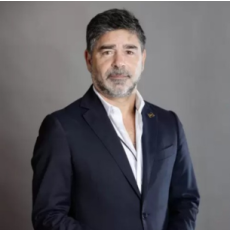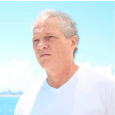How did your journey begin, transitioning from humble beginnings as a street vendor to becoming a business leader?
Growing up in a working-class Jewish family in 1970s Argentina was very different from being poor today. Back then, although we lacked luxuries, we had public education, access to food, and the possibility of upward mobility. My parents were market traders, and from an early age, I felt the drive to help them rather than pursue formal education. I started working with them at the age of eleven, selling goods on buses, washing cars, and eventually taking on more responsibility.
One pivotal moment came when a former boss encouraged me to travel. That exposure changed my mindset—I realised I lacked the education to be in business. I began taking courses, went to therapy, and explored coaching to better understand myself and the business world. Over time, I developed a vertically integrated business model, starting with textiles—growing cotton, manufacturing clothes, and selling them to large retailers like Carrefour. That same approach laid the foundation for Portland’s current model: self-sufficiency and delivering the best product at the best price.
You’ve said that you fell in love with architecture. How did that evolve into Portland’s current mission of building accessible housing?
Yes, architecture became a passion, not just for its design aspects but for what housing represents in society. A home is more than a structure—it’s a fundamental right and a source of dignity. This realisation sparked our ambition to build quality housing at scale for lower-income communities, without any ties to government projects or political ideologies. We are entirely apolitical, simply focused on creating impact through innovation and quality.
Portland is now structured around that goal: building homes using self-sustaining models that ensure affordability while maintaining aesthetics and construction quality. Our projects range from modest housing in oil-rich regions to landmark architectural developments in Latin America. The idea is simple but powerful—dignified housing is a cornerstone of societal progress, and it shouldn’t be a privilege.
How do you view the evolution of Argentina’s housing market, and is there hope for systemic change?
There’s definitely hope, especially if we start prioritising freedom and clear rules over dependency on political ideology. One of the biggest obstacles in Argentina is access to mortgage credit. Since the late '90s, middle and lower-income families haven’t been able to secure financing, and the market has catered almost exclusively to the upper-middle class. That’s unsustainable.
If we implement stable rules and attract long-term capital, we could begin to democratise access to real estate. Financial institutions could then provide more inclusive lending options. Around the world, housing is typically backed by long-term financing—but that has been lacking here. With proper regulation and predictability, the market could thrive again, and more Argentinians could finally buy their first home.
You mentioned the importance of aesthetics in social housing. Why does design matter in that context?
Design isn’t a luxury; it’s essential. We take pride in ensuring that everything we build—whether high-end or low-cost—meets aesthetic standards. We’d never produce something we wouldn’t use ourselves. The idea is to offer even first-time homeowners the joy of living in a well-designed space that feels personal and uplifting.
It’s also a strategic choice. When social housing lacks visual appeal or a sense of dignity, it often leads to neglect and abandonment. We try to avoid that by combining function with design—giving people something they can be proud of, regardless of price point.
Tell us about Portland’s international expansion. What triggered your move into new markets and how have things evolved?
The desire to explore international markets started when I travelled abroad at eighteen. Back then, communication with home was through letters and cassette tapes, but that experience opened my eyes. Today, globalisation has made the world feel smaller, and business opportunities are more accessible—if you’re prepared.
We began our international push around 2015, after being invited to Madrid’s real estate expo. That coincided with a resurgence in Miami’s property market post-2008. We identified an opportunity in the U.S. multifamily housing sector, which operates as a financial vehicle. We pursued this due to favourable interest rate spreads at the time, allowing for returns that outperformed traditional investments.
How has your approach differed between markets like the U.S. and Spain?
The U.S. and Spain require distinct strategies. In the U.S., the financial model is more transactional and fast-paced. Spain, on the other hand, took longer to recover from the 2008 crisis due to its transgenerational debt structure. That created opportunities in abandoned developments with strong construction quality, especially in undervalued areas.
Seven years ago, we bought land in Valderuz, Spain, where we’re now launching our first project. Spain’s biggest constraint is the limited availability of land, which requires careful long-term planning. Our expansion there has been modest but strategic, using only our own capital. Only recently have we begun inviting third-party investors to scale further.
Argentina presents unique challenges. How is Portland addressing the lack of formal credit access?
The reality is that nearly half of Argentina’s population works informally, making them ineligible for traditional bank loans. This isn’t the banks’ fault—they can’t lend money to people who don’t meet formal criteria. To address this, we created our own fund to finance homebuyers directly.
By offering in-house financing, we can later negotiate with financial institutions to absorb these loans. That gives us more flexibility, and allows customers to buy without navigating rigid banking systems. Our core business remains selling houses, not loans. But we’re innovating around financing because it's the only way to expand access to home ownership.
Do you see this financing model scaling beyond Argentina?
Absolutely. While it was born from Argentina’s unique challenges, this model could be replicated globally. Banks aren’t real estate developers, and often lack the expertise to handle housing projects directly. By acting as an intermediary, we manage the risk, structure the deals, and provide packaged credit portfolios to banks.
This approach simplifies things for financial institutions while enabling buyers to access better loan terms. We believe this model aligns everyone’s interests—developers, banks, and, most importantly, the buyers. It’s a way to make housing more accessible without relying solely on state intervention.
How do you balance your commitment to Argentina with your international ambitions?
Argentina remains our core. We currently run more projects than nearly any other firm here, thanks in part to the exit of many major players. While we’re expanding internationally, our focus on Argentina is stronger than ever. At fifty-five, I’ve partnered with younger entrepreneurs to expand the company into a true group structure with various specialised branches—Portland Brothers, Portland Más, and others—all under the Portland umbrella.
We’re also formalising our financing model into a standalone entity within the group. It allows us to treat housing as a large-scale production programme rather than an artisanal craft. Every unit is designed with precision, using high-quality materials, and the process is streamlined for efficiency and affordability.
What drives you personally to pursue this work, beyond business success?
It might sound simple, but it’s legacy. I’ve been blessed with great love and support from my family, even though we struggled financially. That shaped my view of the world. The first time I bought a studio apartment, I realised how transformative owning a home could be. It gave me dignity, security, and a sense of arrival.
That’s the feeling I want to offer others. While our business is for profit, it’s also deeply purposeful. We're building long-term value, not short-term gain. By offering people access to housing, we're not just selling property—we're changing lives. That’s what keeps me going.
You’ve mentioned gratitude as a motivator. How do you view that in contrast with resentment, especially in a society like Argentina’s today?
It’s a profound distinction. I was lucky to be born without resentment – I’ve never been envious of what others had. I was always driven to improve myself. Sadly, in Argentina, decades of political dysfunction have bred resentment as a cultural norm, fuelled by dishonest narratives.
I believe we can counter that through everyday gestures—by building, offering opportunity, and acting with love. Resentment won’t be legislated away. It has to be replaced, slowly, by gratitude and action. I try to live that every day.
Finally, what would you like an international audience—especially U.S. investors—to understand about Portland’s vision and potential?
We’re constantly learning and evolving. Our customers are at the heart of everything we do. Whether it’s a small housing unit or an iconic building like the one we developed with Zaha Hadid’s team, our goal is to satisfy our clients and exceed expectations.
We may not be perfect, but we’re committed. We’re not just an alternative to Miami real estate—we’re a serious player with vision, quality, and purpose. And we’re proud to show what Argentine talent and determination can accomplish.





